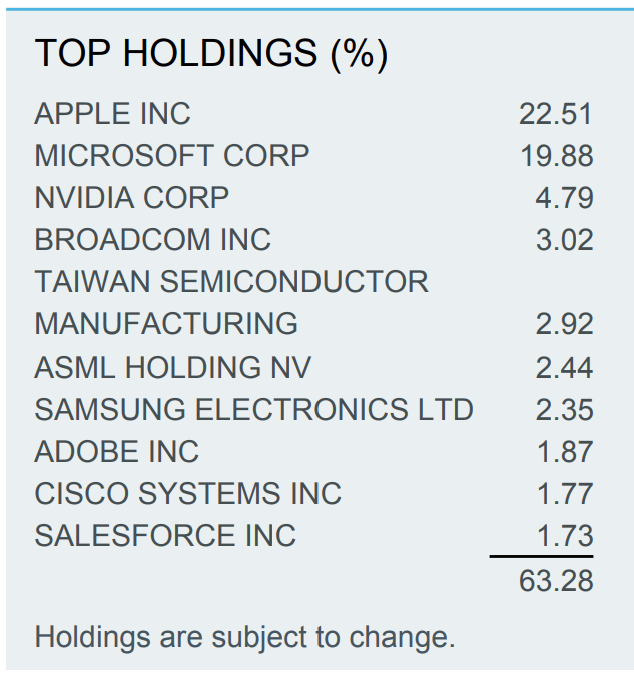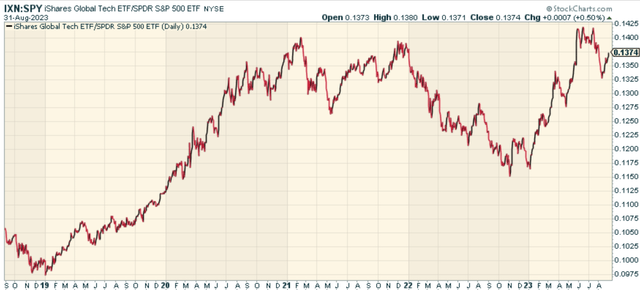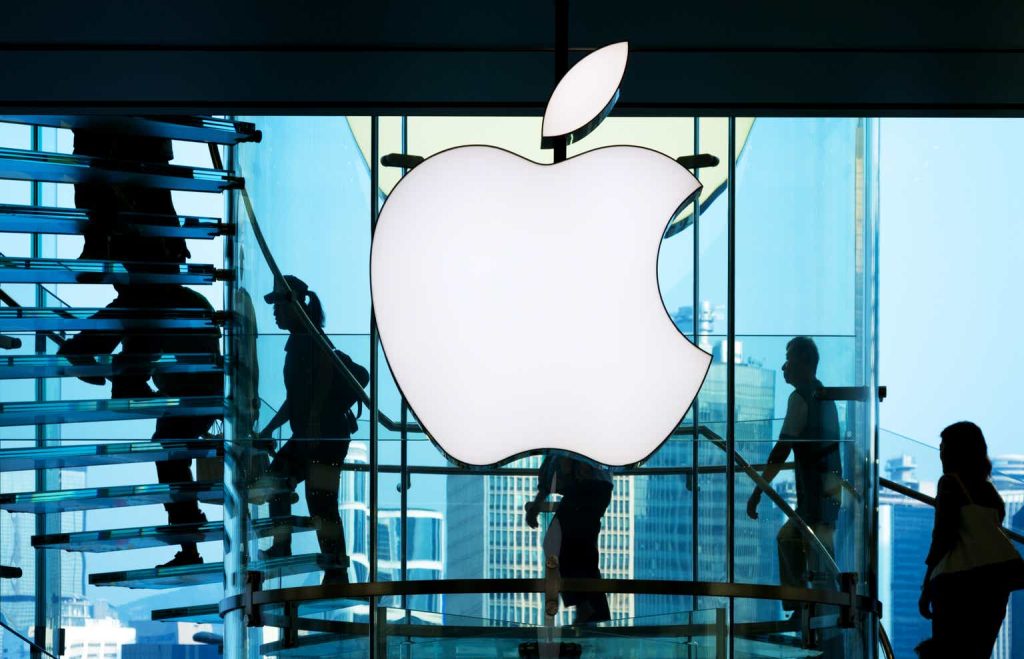“The real problem is not whether machines think but whether men do.” – B. F. Skinner.
Technology is eating the world, but the world isn’t just the U.S. I’ve increasingly been warning that Technology is vulnerable to a correction given just how crowded is when it comes to U.S. markets. But what about Tech stocks outside the U.S.? While that may be a different story, global tech exchange-traded funds, or ETFs, are still largely U.S. proxies – and that’s the problem.
The iShares Global Tech ETF (NYSEARCA:IXN) is an exchange-traded fund managed by BlackRock (BLK), the world’s largest asset manager. Launched in 2001, IXN seeks to track the investment results of the S&P Global 1200 Information Technology Sector Index, comprising global equities in the technology sector.
Despite its name, the iShares Global Tech ETF is heavily concentrated in U.S.-based companies, especially the big tech stocks, which account for a significant portion of its portfolio. This focus on large-cap U.S. tech stocks, while providing potential for significant returns, may limit the fund’s global exposure and sector diversification.
Key Facts About IXN
Here are some crucial facts about the iShares Global Tech ETF:
- Fund Inception Date: November 12, 2001
- Exchange: NYSE Arca
- Ticker Symbol: IXN
- Net Assets as of August 31, 2023: $3,634,920,483
- Number of Holdings as of August 30, 2023: 115
- Expense Ratio: 0.41%
- Benchmark Index: S&P Global 1200 Information Technology 4.5/22.5/45 Capped Index
- 30 Day SEC Yield as of July 31, 2023: 0.56%.
A Closer Look at IXN’s Holdings
The iShares Global Tech ETF boasts of 115 holdings, with the top 10 making up nearly two-thirds of its portfolio, pointing to a high concentration. This skew is primarily due to the colossal market capitalization of its top holdings, namely Apple (AAPL), Microsoft (MSFT), and Nvidia (NVDA).
ishares.com
Apple, the world’s most valuable company, constitutes a whopping 22.51% of IXN’s assets. Microsoft, another tech behemoth, isn’t far behind with a 19.88% share. Other notable constituents include Broadcom (AVGO), Taiwan Semiconductor (TSM), and ASML Holding (ASML).
Looking at the sector-wise distribution, IXN primarily invests in software and services (38.25%), tech hardware and equipment (34.06%), and semiconductors and semiconductor equipment (27.21%). Despite its “global” label, the fund is heavily skewed towards the United States, with U.S. companies constituting over 80% of its holdings. The fund’s international exposure is limited, with Taiwan, Japan, South Korea, the Netherlands, Germany, and France accounting for less than 20% of its total assets.
Given this geographical and sector concentration, investors should bear in mind that while IXN offers exposure to global tech stocks, its portfolio is predominantly U.S.-centric and concentrated in a few tech giants.
IXN’s Performance Analysis
IXN has demonstrated robust performance over the years, consistently delivering impressive returns to its investors. For instance, it has generated a three-year annualized total return of 17.41% and a five-year annualized total return of 18.80%. Over the past decade, it boasts of an annualized total return of 19.34%.
If we look at IXN relative to the S&P 500 (SP500), the ratio looks toppy.
Stockcharts.com
Comparing IXN with Peer ETFs
When comparing IXN with other technology ETFs, two popular funds come to mind: the Invesco QQQ Trust (QQQ) and the Technology Select Sector SPDR Fund (XLK). Both these funds primarily invest in U.S. tech stocks, making them relevant peers for comparison.
However, it’s worth noting that while QQQ and XLK focus solely on U.S.-listed tech stocks, IXN offers a slightly broader exposure by including a few non-U.S. tech stocks in its portfolio. This slight geographical diversification can potentially offer IXN investors better risk-adjusted returns.
Conclusion: Is IXN a Good Investment?
The iShares Global Tech ETF presents a compelling investment opportunity for those looking for exposure to the rapidly growing tech sector. Its focus on large-cap U.S. tech stocks, while limiting its global and sector diversification, could potentially offer significant growth opportunities, given these companies’ leading positions in the tech industry.
However, investors should be aware of IXN’s high concentration in a few tech giants and its limited international exposure. Moreover, its expense ratio, while not exorbitantly high, is higher than some of its peers, which could impact long-term returns. Just be aware this really isn’t as global as the name of the fund would have you believe.
Read the full article here















